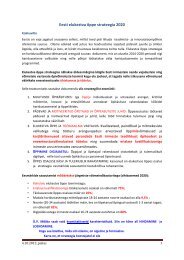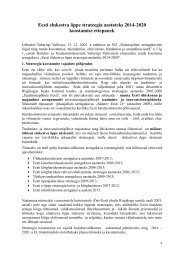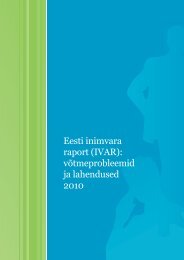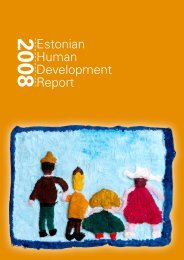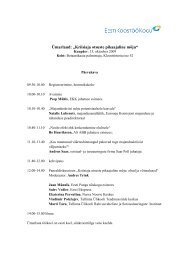DEVELOPMENT
The pdf-version - Eesti Koostöö Kogu
The pdf-version - Eesti Koostöö Kogu
Create successful ePaper yourself
Turn your PDF publications into a flip-book with our unique Google optimized e-Paper software.
sign. It seems that the usual view of Estonia’s population,<br />
as being comprised of depressed pessimist, is not<br />
justified now.<br />
3.3.3<br />
Factors affecting subjective well-being<br />
What does subjective well-being depend on? The material<br />
situation and people’s wealth are definitely important factors.<br />
Generally, people in wealthier societies are more satisfied<br />
with their lives than those in poorer countries (see<br />
also sub-chapter 3.1.1). However, the connection between<br />
wealth and well-being is not linear, nor is it absolute,<br />
and researchers allude to the many particularities of this<br />
connection.<br />
Firstly, the impact of wealth depends on the context.<br />
Internally, the connection between income and<br />
subjective well-being is usually weaker than internationally.<br />
Diener’s analyses show that the correlation<br />
between income, and subjective well-being internally,<br />
by state, usually, is in the range of 0.15 – 0.20, whereas<br />
in international comparisons, the connection is significantly<br />
stronger (the average of various studies is ca.<br />
0.60). Diener provides the following explanation for<br />
this: in the wealthier states, besides the differences in<br />
income levels, many other important factors (that are<br />
not dependent on income level) affecting satisfaction<br />
have developed, such as honouring human rights, equitable<br />
treatment, and a better level of education. (Diener,<br />
Biswas-Diener 2002, 132).<br />
Secondly, wealth impacts subjective well-being<br />
more strongly among the poorer classes of society, and<br />
in poorer states. There is less impact in the wealthier<br />
ones. It turns out that the higher-income people in<br />
wealthy states are only somewhat happier than their<br />
poorer compatriots. According to Diener, „for middle<br />
and upper-income people in economically developed<br />
nations, acquiring more income is not likely to strongly<br />
enhance subjective well-being“. (Diener, Biswas-Diener,<br />
2002, 149).<br />
Thirdly, subjective well-being is not shaped so much<br />
by the absolute income level, but rather, by the relative<br />
level. What is important is my material situation, in<br />
comparison to those close to me, to my acquaintances<br />
and to other members of the society (Easterlin 2003). An<br />
important basis for comparison also seems to be people’s<br />
“personal histories” – their previous level of well-being.<br />
If the trend is downward, it also significantly lowers<br />
subjective well-being. Although the absolute value of<br />
the Italians’ and Greeks’ incomes is significantly higher<br />
than the Estonians’, their subjective well-being indicators<br />
are rapidly moving downward (and are lower than the<br />
Estonians’ indicators today), thanks to comparisons with<br />
“how things were before.”<br />
Wealth is not the only determinant of subjective<br />
well-being. In the Gallup ranking, Mexicans rate their<br />
lives better than Germans, although economic logic would<br />
assume the opposite. Research data points to the fact that<br />
the wealthier a society becomes, the more important the<br />
“non-material” factors affecting well-being become. These<br />
include health, work, and family life (Easterlin 2003), but<br />
also people’s involvement in social life, and interpersonal<br />
Figure 3.3.3<br />
Optimism about the future.<br />
Stronly agree Agree Neither agree no disagree<br />
Disagree<br />
Percentage<br />
Greece<br />
Slovakia<br />
Portugal<br />
Italy<br />
France<br />
Hungary<br />
Cyprus<br />
Czech Republic<br />
Slovenia<br />
Belgium<br />
Bulgaria<br />
EL-27<br />
Romania<br />
Latvia<br />
Great Britain<br />
Spain<br />
Malta<br />
Luxembourg<br />
Lithuania<br />
Austria<br />
Poland<br />
Estonia<br />
Germany<br />
Netherlands<br />
Ireland<br />
Finland<br />
Denmark<br />
Sweden<br />
Percentage<br />
Strongly disagree<br />
Source: Eurofound, 2012, 31<br />
0 10 20 30 40 50 60 70 80 90<br />
0 10 20 30 40 50 60 70 80 90<br />
trust (Helliwell, Putnam 2004, 1444). Education level is<br />
also a determining factor – in practically all the states,<br />
people with higher educations are happier, and more<br />
satisfied with life than those who are less educated (Education<br />
at Glance 2011, 192).<br />
Therefore, wealth is an important factor influencing<br />
subjective well-being. However it is a principal force, primarily,<br />
in the societies that are at a “lower development<br />
phase”, i.e. at a time when most people are worried about<br />
satisfying their elementary needs – about making ends<br />
meet. For those who have made it out of the poverty zone<br />
(including the majority of Estonian people), the quality of<br />
life in the broader sense has a greater impact on subjective<br />
well-being.<br />
Estonian Human Development Report 2012/2013<br />
127



